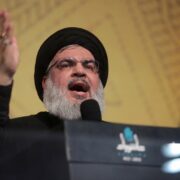Hossein Alai, a former commander of the Guards, told Iran’s Jamaran website, without citing evidence: “The United State definitely had close co-operation with Israel in both operational and intelligence aspect in the plan to assassinate Haniyeh.
“By carrying out this assassination, Israel wanted to show Palestinian groups that there is no safe place for them to live and be present anywhere in the world … it was also a message to Pezeshkian that we will not allow changes in Iran and its establishment of good relations with the world.”
US secretary of state Antony Blinken said in Singapore the US was not involved in Haniyeh’s killing.
What are Iran’s options for retaliation?
Iran has several options, according to analysts, officials and militant leaders, but all carry risks of escalation.
It could respond by launching drones and missiles in a retaliatory strike on Israel, similar to the retaliatory attack it launched after Israel targeted its embassy compound in Damascus in April, killing seven senior military commanders.
Israel then retaliated with a calibrated attack on Iranian territory that caused no human losses.
Iran could also assassinate Israeli diplomats or officials or attack Israeli missions overseas.
Tehran may opt to retaliate via armed proxies, including Lebanon’s Hezbollah, Yemen’s Houthis and Iraq’s Shiite militias, which could step up their attacks against Israel and US interests in the region.
“This Israeli attack on Haniyeh is embarrassing for Iran. It is a strike at the heart of Iranian leadership; it is a strike at the security and intelligence establishment,” said Adeeb Ziadeh, an expert in international affairs at Qatar University who has studied Hamas.
Iran would have to respond to make up for what was a major security shortcoming, Ziadeh said, adding: “This is a powerful and harsh hit to Iran.”
What does this mean for Hezbollah?
The attack on Shukr compounded the risks of escalation in the conflict between heavily armed Hezbollah and Israel, which have been exchanging fire since the Gaza war erupted in October in a largely contained confrontation.
Analysts say Hezbollah will be compelled to retaliate with a response that reflects his standing as Hezbollah’s top military commander but also takes account of the fact that Israel struck him in the Hezbollah-controlled southern suburbs of Beirut.
Hezbollah could attack areas of Israel it has not yet hit in the current conflict, including urban centres, risking a spiral of retaliation and counter-retaliation.
Who succeeds Haniyeh?
The most likely successor was Hamas political leader Khaled Meshaal, Haniyeh’s deputy-in-exile who lives in Qatar, analysts and Hamas officials said. Under Meshaal, Hamas had emerged as an ever more important player in the Middle East conflict due to his charisma, popularity and regional standing, analysts said.
Meshaal narrowly survived an assassination attempt ordered by Netanyahu in 1997.
Senior Hamas official Khalil al-Hayya was also a possibility as he was a favourite of Tehran and its allies in the region, the analysts said. Meshaal’s relations with Iran have been strained due to his support of the Sunni-led 2011 Syrian revolt against President Bashar al-Assad.
Yahya Sinwar, who masterminded the October 7 Hamas attacks on Israeli cities, will remain the commander in Gaza.
What now for Gaza ceasefire?
The killing of Haniyeh, a crucial interlocutor in the Gaza ceasefire and hostage negotiations, has ended any chance of an imminent agreement, Hamas sources and analysts say.
What now for Netanyahu?
Netanyahu’s government was silent on Haniyeh’s killing, though some hardline ministers not connected with defence and foreign policy posted celebratory messages on social media.
The government has faced rifts over issues including the conduct of the Gaza war, with hardline religious nationalist parties pressing the military for tougher action.
But ministers have been united on the need to destroy Hamas and opposition leader Yair Lapid welcomed Haniyeh’s killing, while social media carried images of Israelis celebrating.
“Netanyahu will have, at least for a moment, what he wants: becoming the flag around which Israelis rally. And his coalition will certainly not turn against him,” said Uriel Abulof, an associate professor at Tel-Aviv University’s School of Political Science, Government and International Affairs.
Families of hostages in Gaza, who have led protests pushing for a deal to halt the fighting, said true security depended on the release of all remaining 115 hostages and urged Netanyahu to accept a deal proposed by US President Joe Biden.
Reuters











Comments